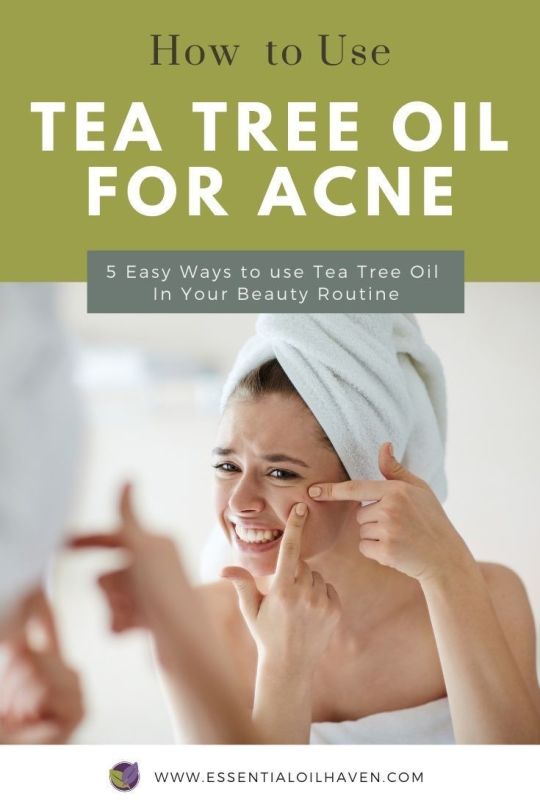#teatreeoil
Text
Get glowing skin with these top 5 natural ingredients
Looking for a way to give your skin a healthy, natural glow? Look no further than your organic skincare products! The beauty industry is buzzing with the benefits of using natural ingredients, and for good reason. These ingredients can nourish, hydrate, and protect your skin in a way that synthetic ingredients simply cannot. Here are the top 5 natural ingredients you should look for in your organic skincare products.
Aloe vera:
This succulent plant is a powerhouse of skin benefits. It's known for its soothing, hydrating, and anti-inflammatory properties, making it a great choice for anyone with dry, irritated, or sensitive skin. Look for products that contain a high concentration of aloe vera, such as a moisturizer or a face mask. To use, simply apply the product to your skin and let it absorb for a few minutes before rinsing off.
Jojoba oil:
Unlike many other oils, jojoba oil is very similar to the natural oils produced by our skin. This makes it a great choice for anyone with oily or acne-prone skin, as it can help regulate oil production without clogging pores. Jojoba oil is also very gentle on the skin and can be used as a standalone moisturizer or added to your existing moisturizer for an extra boost of hydration.
Tea tree oil:
This essential oil is known for its antibacterial and antifungal properties, making it a great choice for anyone with acne or other skin blemishes. Tea tree oil can be added to a facial toner or used as a spot treatment to help fight breakouts. It's important to note that tea tree oil should be used in small concentrations and diluted with a carrier oil, as it can be irritating to the skin in its pure form.
Rosehip oil:
This oil is packed with antioxidants, vitamins, and fatty acids that nourish and repair the skin. It's particularly effective at reducing the appearance of scars and fine lines, making it a great choice for anyone with aging skin. Look for a serum or face oil that contains rosehip oil and apply it to your skin after cleansing and toning.
Green tea extract:
This powerful antioxidant is known for its ability to protect the skin from free radicals and other environmental stressors. It also has anti-inflammatory properties, making it a great choice for anyone with sensitive or acne-prone skin. Look for a facial mist or serum that contains green tea extract and use it before applying your moisturizer to give your skin an extra boost of protection.
Incorporating natural ingredients into your skincare routine can be a great way to give your skin the TLC it deserves. However, it's important to remember that natural ingredients may not work for everyone, and it's always a good idea to patch test new products and consult with a dermatologist if you have any concerns. With these top 5 natural ingredients, you'll be well on your way to achieving healthy, glowing skin.
#organicskincare#naturalbeauty#skincareingredients#aloevera#jojobaoil#teatreeoil#rosehipoil#greenteaextract#glowingskin#beautysecrets#healthyskin#naturalskincare#plantbasedbeauty#veganbeauty#crueltyfreebeauty#skincaretips#skincareblog#beautyblog#tumblrbeauty#beautycommunity
9 notes
·
View notes
Video
youtube
The TRUTH about Tea Tree Oil: Good or Bad for your Eyes?
#teatreeoil#tea tree oil#tea tree oil and dry eye#tea tree oil eyes#tea tree oil eyelids#tea tree oil eyelashes#teatree#tea tree oil and demodex#doctor eye health#dreyehealth#optometry#eyehealth#health
2 notes
·
View notes
Text
Oli essenziali nella medicina olistica

A chi di voi non è capitato di sentire parlare di oli essenziali? Sono certa che almeno una volta avete provato un rimedio per la salute con olio essenziale al suo interno. ma perché sono così importanti e a cosa servono?
Gli oli essenziali sono nient'altro che sostanze estratte dalle piante (fiori, radici, corteccia, frutti e semi) caratterizzate da un aroma intenso.
o e sono utilizzate per la salute di corpo e mente dall'antichità.
C'è da dire che vi è una vasta gamma di oli essenziali e ognuno è utilizzato per uno scopo diverso. Alcuni alleviano i mal di testa, altri rilassano la mente riducendo lo stress, si possono inoltre usare per curare le vie respiratorie e sulla cute arrossata.
Gli oli si possono prendere per via orale ma anche sfregare sulla pelle o farli inalare tramite un profumatore per ambienti.
Vediamo insieme quali sono i principali oli essenziali usati e a cosa servono:
Iniziamo con quelli consigliati per dare sollievo all’apparato respiratorio e alle vie aeree. Capita, soprattutto in determinati periodi dell’anno, di essere colpiti da tosse, raffreddore, mal di gola, bronchite e altri disturbi simili: in questi casi potreste impiegare oli essenziali dall’azione antinfiammatoria, antisettica, balsamica ed espettorante.
Citiamone qualcuno. In simili circostanze sono ideali l’olio essenziale di eucalipto e quello di rosmarino, il tea tree oil e l’olio essenziale di timo. Senza dimenticare l’olio di menta piperita, che ci aiuta a espellere i muchi.
Desiderate, invece, un olio essenziale che supporti la bellezza e la salute della vostra pelle? L’olio essenziale di lavanda combatte le irritazioni cutanee; quello di tea tree è suggerito per riequilibrare la produzione di sebo e per ridurre brufoli e punti neri; gli oli essenziali di geranio e di rosa sono antiossidanti e contrastano la comparsa prematura delle rughe.
Ricordiamo anche gli oli essenziali per lo stomaco e per l’intestino: quelli che facilitano la digestione, attenuano l’acidità gastrica e limitano i rischi di gastrite, colite ecc. L’olio essenziale di camomilla è antinfiammatorio per lo stomaco, mentre l’olio essenziale di menta piperita è in grado di sostenerci contro la sindrome del colon irritabile grazie alle sue proprietà spasmolitiche e antibatteriche.
Contro i dolori articolari invece suggeriti l'olio essenziale di wintergreen e quello di ginepro, che fanno davvero bene ai muscoli e alle articolazioni se applicati con un massaggio.
Esistono oli essenziali indicati soprattutto per il benessere della psiche. Quelli rilassanti sono la lavanda, l'arancio, incenso, camomilla e l'ylang-ylang. Come energizzanti sono ottimi invece la menta e il limone. Per dormire meglio la camomilla, la valeriana, il bergamotto e la lavanda.
Gli oli essenziali di menta piperita e di incenso stimolano il sistema nervoso, e sono raccomandati nei periodi molto intensi a livello di studio e di lavoro.
L’olio essenziale di citronella scaccia i pensieri tristi e gli stati depressivi, quello di pompelmo rosa risolleva lo spirito, quello di pino regala un nuovo vigore sia al corpo sia alla mente. L’olio essenziale di vaniglia è fonte di serenità, quello di mandarino lenisce la tensione.
Acquista su Shop @ Magiko
Read the full article
0 notes
Text
Exploring the Use of Tea Tree Oil: Remedies, Recipes, and More

The use of tea tree oil has become an increasingly popular essential oil used for a wide variety of health, household, and beauty purposes. This versatile oil, derived from the leaves of the Melaleuca Alternifolia plant, native to Australia (commonly known as the Australian Tea Tree), offers many benefits thanks to its anti-bacterial, anti-fungal, anti-viral, and anti-inflammatory properties.
In this comprehensive guide, we will explore the top uses of tea tree oil, from home remedies to DIY recipes for skin and hair care. You’ll learn how to harness the healing power of tea tree oil to tackle everything from acne to respiratory issues.
We’ll also cover proper dilution and safety precautions for using this potent plant-based oil. Read on to learn about the many other tea tree oil uses!
The Use of Tea Tree Oil is Widespread, So What is Tea Tree Oil and Why Use It?
Essential Oil of Melaleuca Alternifolia
Tea tree oil is an essential oil steam distilled from the leaves of the Melaleuca Alternifolia plant. It is also called melaleuca oil, or Australian tea tree oil. This natural oil has a fresh camphoraceous odor and a color that ranges from pale yellow to nearly colorless and clear.
Tea tree oil contains various compounds like terpinen-4-ol that give it strong antimicrobial, antibacterial, antifungal, and antiviral properties.
The use of tea tree oil also has medicinal benefits thanks to its anti-inflammatory effects that can help treat skin conditions, support wound healing, fight respiratory issues, and more.
Thanks to these therapeutic effects, tea tree oil is used in natural medicines and cosmetics. It’s gentler on the body compared to conventional medications because it’s plant-based, and research shows tea tree oil can be just as effective as prescription options for some health issues.
Tea tree oil is versatile, safe (if used correctly), and cost-effective, so use tea tree oil as a natural remedy and alternative to conventional, potentially harmful products. Do consult with a healthcare professional if you suffer from any serious complaint before switching.
The Use of Tea Tree Oil - YouTube Video
Are Some People Allergic To Tea Tree Oil?
Though the use of tea tree oil is usually well-tolerated, it can occasionally trigger allergic skin reactions in sensitive individuals when applied topically.
While around 1% of people may develop an allergy to tea tree oil components, those with known skin conditions like eczema or dermatitis face a higher relative likelihood of immune responses emerging.
For those with pre-existing sensitivities, immune reactions like redness, rashes, hives, swelling, and itching can manifest where diluted tea tree oil is applied topically. The risk varies on an individual basis, but caution is warranted for this subgroup when adding any new botanical oils to skincare routines.
Signs of possible tea tree oil allergy typically arise within 24-48 hours after contact with your skin. Applying a diluted patch test area first is recommended to screen for allergic reactions before continued use.
Use of tea tree oil should be discontinued if a strong irritation arises and you should wash the area thoroughly with mild soap and water. It is important to seek medical treatment right away for rare acute symptoms like facial puffiness, trouble breathing, or swallowing which signal dangerous anaphylaxis requiring epinephrine intervention.
For most adults, topical tea tree oil suitably diluted is non-allergenic and harmless when used properly on unaffected normal skin. But folks with chronic conditions like eczema or known contact allergies should use them cautiously or should avoid them altogether due to risks.
Consulting a doctor before use is best to ensure safety based on individual health status and risk factors. Essential oil allergies can develop unexpectedly over time as well. So, stay vigilant when integrating any new botanical-based products into your daily health regimens.
How Should You Use Tea Tree Oil?
Topically applied tea tree oil is generally safe when properly diluted; you should avoid ingestion. To reiterate, before applying it to your skin, do a patch test on a small area to check for any allergic reactions first.
Always dilute tea tree oil before use because it’s very potent and can cause skin irritation when applied directly. As a rule of thumb, tea tree essential oil should be mixed with a carrier oil or product in a 1:9 ratio.
For a standard dilution, add 2-3 drops of tea tree oil per teaspoon (about 5ml) of carrier oil like coconut, jojoba, almond, or olive oil.
Now let’s get into the many uses and benefits of this incredible essential oil!
What Are The Health Benefits Of Tea Tree Oil For Skin Problems?
Tea tree oil is used topically for numerous skin conditions and is effective due to its antimicrobial and anti-inflammatory properties:
The Use of Tea Tree Oil For Acne

Propionibacterium Acnes under an electron microscope
Tee tree oil is an effective antibacterial and antimicrobial agent in the treatment of acne. It is great at fighting acne-causing bacteria like Propionibacterium Acnes that clog pores and cause inflammatory breakouts.
Multiple studies show that applying tea tree oil solutions, serums or facial washes can significantly improve mild to moderate acne.
The terpinen-4-ol compound found in tea tree oil helps unblock sebum-clogged hair follicles by dissolving the sebum. This allows pores to drain properly.
The anti-inflammatory properties of tea tree oil also calm the redness and swelling of acne bumps.
Using a 5 percent tea tree oil gel for 8 weeks can reduce acne lesions just as well as a 5 percent benzoyl peroxide lotion, without harsh side effects like peeling and redness.
How Does The Use of Tea Tree Oil Help Treat Athlete’s Foot and Fungal Nail Infections?
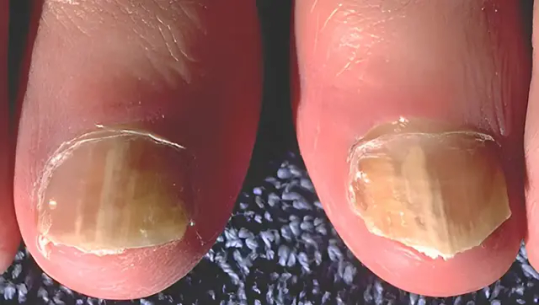
Thanks to its anti-fungal effects, tea tree oil can fight stubborn fungal infections like athlete’s foot and nail fungus.
Fungal infections happen when an opportunistic fungus like dermatophytes or Candida overgrows on the skin, nails, or hair. By damaging the cell walls and membranes of fungi, tea tree oil has been shown to control fungal overgrowth.
For localized fungal infections, use diluted tea tree oil as a topical treatment twice a day for 2-4 weeks until symptoms resolve. Applying a 10% tea tree oil cream helps clear athlete’s foot symptoms of scaling, inflammation, and itching in a few weeks by penetrating the thick skin on the soles.
Applied directly to infected toenails and fingernails, tea tree oil's potent antifungal properties can help clear up stubborn nail fungus infections caused by dermatophytes. The terpinen-4-ol compound penetrates the nail bed to inhibit fungal growth while restoring healthy nails.
Start by cleaning underneath nails, then apply a tiny amount of undiluted tea tree oil on nails and cuticles using a cotton swab or brush twice daily until the fungus is resolved.
For nail fungus, applying 100% tea tree oil to the cuticle and under the nail twice daily can improve discolored or brittle nails.
Does Tea Tree Oil Treat Dandruff or Scalp Conditions?
With its anti-fungal effects, the use of tea tree oil may help in treating dandruff triggered by Malassezia fungus or scalp eczema and psoriasis aggravated by fungal infections.
Adding a few drops of tea tree oil to your favorite shampoo helps reduce flaking and itching. Or try this intensive tea tree oil hair mask to soothe an irritated, flaky scalp:
Mix 5 drops of tea tree oil with 2 tablespoons of coconut oil. Massage into scalp and let soak for 20 minutes. Rinse out and shampoo. Use 1-2 times a week between washes for fast relief.
If you want, you can buy tea tree oil shampoo, instead of creating your own and there are other products containing tea tree oil, such as toothpaste (but always spit it out, never swallow it).
Can The Use of Tea Tree Oil Soothe Eczema, Rosacea, or Psoriasis Flare-Ups?
Thanks to its anti-inflammatory, antimicrobial, and wound-healing benefits, diluted tea tree oil can calm many common skin conditions like eczema, rosacea, and mild psoriasis:
Eczema: Applying a 5% tea tree oil cream for 4 weeks helps ease itchy rashes and clears up eczema skin infections better than a placebo cream, allowing skin to heal faster. Always patch test first.
Rosacea: The antibacterial effect of tea tree oil helps treat secondary skin infections that aggravate rosacea. Mix 2 drops of oil with a dollop of moisturizer and apply to the face twice a day to reduce redness and inflammation.
Psoriasis: Tea tree oil has antimicrobial effects against Staphylococcus Aureus bacteria which may trigger psoriasis flares. Diluted tea tree oil can calm inflamed, scaly patches by reducing cytokine immune activity. Start with a 0.33 to 1 percent dilution.
Can The Use of Tea Tree Oil Help to Treat Cold Sores, Chickenpox, or Shingles?
Thanks to its antiviral effects, the use of tea tree oil can help treat viral skin infections like cold sores, chickenpox, and shingles caused by the herpes simplex virus (HSV). Applying a 6% tea tree oil gel helps heal cold sores faster by inhibiting the virus and reducing blistering better than placebo.
For itchy chickenpox and shingles rashes, add 10-15 drops to a cup of colloidal oatmeal bath soak to ease symptoms. The anti-inflammatory action calms itch and pain, allowing the skin to heal.
Always patch test diluted oil first and stop use if skin becomes irritated.
Does Tea Tree Oil Heal Wounds or Insect Bites Faster?
The antimicrobial benefits of tea tree oil are great for disinfecting and healing minor cuts, burns, and abrasions. It helps prevent wound infections, dry out blisters, and accelerate the wound closure process so the skin heals faster with less scarring.
Just cleanse the area first and apply 2-3 diluted drops onto the wound 1-2 times daily. You can also prevent itching and infection of bug bites by dabbing on some diluted tea tree oil. The anti-inflammatory compounds calm redness, pain, and inflammation.
Can You Make Your Own Hand Sanitizer with Tea Tree Oil?
Certainly! With its strong antiviral, antibacterial, and antifungal effects against common germs, adding a few drops of oil to some aloe vera gel or liquid soap makes a nice natural hand sanitizer.
Just shake together: 1/2 cup aloe vera gel, 1/4 cup liquid castile soap, 10-15 drops tea tree oil, and 10 drops lemon essential oil. Transfer to a dispenser bottle and use as needed.
The tea tree oil kills 99.9% of bacteria while conditioning aloe vera soothes hands. Vitamin E oil helps counter the drying effects of alcohol-based sanitizers. This also makes a great surface cleaner for phones, toys, and counters!
What Respiratory Problems Can Tea Tree Oil Treat?
Thanks to its ability to open up nasal passages and airways, tea tree oil can provide relief for common respiratory complaints like:
Chest and Nasal Congestion:
The expectorant properties help loosen mucus secretions associated with colds, allergies, asthma, and bronchitis so you can breathe more easily. Add 5 drops to a bath or diffuser at home and inhale.
Sinus Infections:
Tea tree oil’s antimicrobial effects help to clear sinus inflammation triggered by bacteria or fungi. Mix 2 drops with coconut oil, massage into sinus areas, and inhale deeply. The vapors help open up nasal airways, too.
Sore Throat:
The use of tea tree oil can help fight strep bacteria and oral thrush fungus that cause sore throats. Add 1 drop to a cup of warm water with lemon and honey and gargle to coat the throat. Avoid swallowing.
Does Tea Tree Oil Repel Insects Naturally?

For a natural bug spray:
Thanks to its strong aromatic scent, tea tree oil can drive away flying and crawling pests like mosquitoes, flies, and ants. mix 10 drops with 2 ounces of witch hazel or aloe vera gel and store in a spray bottle.
The oil helps mask human scents that attract biters. Spritz over exposed skin or around entryways whenever bugs are bothering you.
For an indoor insect-repellent candle:
Add 10-15 drops of melted soy or beeswax and pour into a container with a wick. Light the candle for 2-3 hours in affected rooms to deter pests without having to use toxic chemicals. You can also wipe down surfaces with a tea tree cleaning spray.
Air Freshener and Mold Killer:
Add several drops to a spray bottle filled with water to eliminate bad smells lingering around the house. The anti-fungal action kills mold on tiles, shower curtains, window panes, and sinks while leaving a light, clean scent. Shake well before each use.
Other Household Uses For Tea Tree Oil:
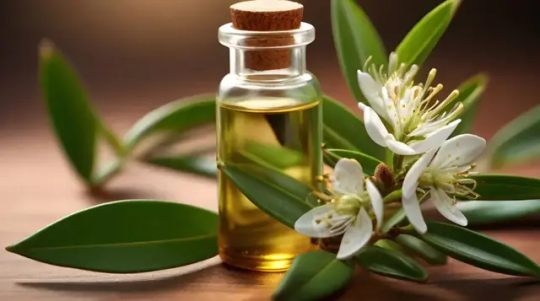
The use of tea tree oil in the home may surprise you, but with its antimicrobial power, tea tree oil is great for household cleaning and odor elimination in bathrooms, kitchens, and other rooms. Use tea tree oil as an alternative to conventional products.
Natural Disinfectant Cleaner:
Mix 20-25 drops with 1/2 cup of apple cider vinegar and 1/4 cup water in a spray bottle. Spritz directly onto kitchen/bathroom counters, floors, toilets, and stoves. Wipe down with a clean, dry cloth.
Rinsing is not necessary since it’s all-natural.
Laundry Booster:
For fresh-smelling laundry without chemicals, add 5-6 drops to damp clothes in the washer drum before starting the normal cycle. The antimicrobial effects of tea tree oil help kill bacteria in fabric fibers.
Fight Oral Plaque
The antibacterial abilities of tea tree oil make it useful for maintaining good oral health. Research indicates adding a small drop to your regular toothpaste when brushing may supplement flossing and brushing by helping reduce the buildup of dental plaque, gingivitis inflammation, and bleeding.
Tea tree oil's plaque-removal actions could even combat foul breath. However, more studies proving safety and ideal concentrations for short and long-term use are still needed.
Relieving Foot Soak
An antifungal foot bath with several drops mixed into the soak water can help treat athlete’s foot triggered by fungus like Tinea Pedis, (it is also the medical name for Athlete's Foot). The warm water opens up skin pores allowing penetration of medicinal tea tree oil. This foot soak simultaneously softens thickened skin on the heels and ball of the foot also prone to painful cracks and calluses.
For an intensive moisturizing foot treatment, add a spoon or two of Epsom Salts as well which reduces soreness. Doing this weekly reduces the chances of transmitting infections through shower or pool surfaces too.
Body Odor Treatment
Tea tree oil's antimicrobial effects may help eliminate underarm body odor. Excessive bacterial buildup on sweaty underarm skin interacts with perspiration to produce embarrassing odors.
Adding a few drops of tea tree oil mixed with some baking soda into your daily bath water can inhibit bacteria.
You can combine baking soda, tea tree oil, and lavender essential oil to make a natural deodorant by mixing a spoonful of baking soda with 5-6 drops of tea tree oil, and a few drops of lavender oil plus enough water to form a paste.
Apply under your arms as a body odor remedy. Its fresh herbal scent leaves underarms smelling clean and refreshes clothing too.
Oral Thrush Treatment
The anti-fungal properties of tea tree oil make it useful against Candida Fungal overgrowth in the mouth or tongue region which causes the condition Oral Thrush or Oral Candidiasis.
Swishing around slightly diluted tea tree oil inside the mouth can help clear discomforts like white patches, soreness, bad breath, and difficulty swallowing or eating.
The oil intake helps control fungal spread by preventing adhesion onto mouth surfaces. However, it does have a pungent taste. Dilute with a teaspoon of water and use cautiously around lips or wounds. Do not ingest tea tree oil or tea tree oil mixtures.
Heal Sunburnt Skin
When skin becomes reddened, inflamed, and painfully sunburnt, applying some diluted tea tree oil provides relief due to its anti-inflammatory and soothing actions. Tea tree helps take down swelling and calm that hot irritated sensation.
Mix a few drops into some aloe vera gel to boost your burn healing by cooling, hydrating, and disinfecting the damaged skin while new layers regenerate.
Be sure to patch test first since sunburnt skin can be more sensitive or reactive to essential oils. Limit sun exposure until recovered.
Treat Vaginal Infections
The antiseptic and antimicrobial effects of tea tree oil can help treat inflamed vaginal tissue caused by irritating fungal and bacterial infections like yeast infections or vaginitis.
Add 5-8 drops diluted in some coconut or almond oil into lukewarm bath water. Soak the inflamed vulva area.
Read the full article
0 notes
Text
Unlock the Power of Tea Tree Essential Oil
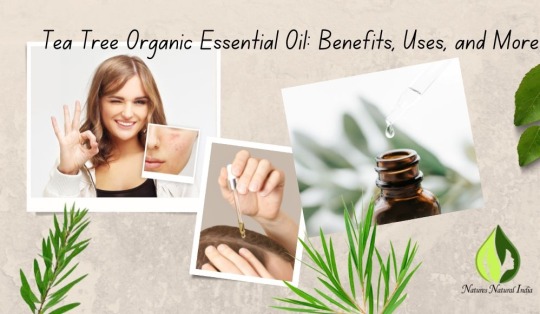
Embrace the natural wonders of Tea Tree Essential Oil with its incredible benefits and versatile uses!
Benefits:
Antimicrobial Marvel: Tea tree oil is a powerhouse against bacteria, viruses, and fungi, making it a go-to for healthy skin and nails.
Skin Soother: Its anti-inflammatory properties can calm irritated skin, helping with acne, eczema, and other skin conditions.
Hair Health Hero: Promote a healthy scalp and luscious locks by incorporating tea tree oil into your hair care routine.
Immune Support: Some studies suggest tea tree oil may lend a hand in boosting the immune system – a natural wellness ally!
Versatile Uses:
Acne-Fighting Face Mask: Mix a few drops with clay for a purifying face mask that bids farewell to blemishes.
Natural Deodorizer: Add a few drops to your DIY deodorant for a fresh and clean scent.
Soothing Scalp Treatment: Blend with a carrier oil and massage into the scalp for a revitalizing hair and scalp treatment.
Aromatherapy Magic: Diffuse tea tree oil to cleanse the air and create a refreshing atmosphere in your home.
Discover the endless possibilities with Tea Tree Essential Oil – nature's gift for a radiant and revitalized you!
#TeaTreeOil#NaturalWellness#EssentialOilsMagic#teatreeessentialoil#teatreeoiluses#teatreeoilbenefits
0 notes
Text
#teatreeoil#essentialoils#naturalremedies#antibacterial#antifungal#antiviral#healing#wellness#beauty#skincare#haircare#homeremedies#DIY#holistic#naturalliving#sustainable#ecofriendly#greenbeauty#cleanbeauty#crueltyfree#vegan#organic
0 notes
Text
Is It Good to Use Tea Tree Oil on Your Face?

Tea tree oil, derived from the leaves of the Melaleuca alternifolia plant native to Australia, has gained popularity in recent years for its potential skincare benefits. From acne treatment to addressing various skin issues, tea tree oil is often touted as a natural remedy. In this article, we will explore the benefits, risks, and common questions surrounding the use of tea tree oil on the face.
Introduction
Tea tree oil is renowned for its antimicrobial and anti-inflammatory properties, making it a compelling choice for skincare. Before incorporating it into your routine, it's crucial to understand both its advantages and potential drawbacks.
Benefits of Tea Tree Oil for the Face

- Acne Treatment: Tea tree oil is renowned for its potent antibacterial properties, making it effective against acne-causing bacteria. Applying diluted tea tree oil to affected areas can help reduce the severity and frequency of breakouts.
- Anti-Inflammatory Properties: Inflammation is a common issue in various skin conditions. Tea tree oil has anti-inflammatory effects that can soothe redness and swelling, providing relief for conditions like acne, eczema, and psoriasis.
- Unclogs Pores: Tea tree oil has the ability to penetrate deep into the skin and help unclog pores. This makes it beneficial for preventing and treating blackheads and whiteheads, contributing to clearer skin.
- Controls Excess Oil Production: For individuals with oily skin, tea tree oil can help regulate sebum production. By controlling oiliness, it minimizes the risk of pore blockages and reduces the likelihood of acne development.
- Natural Antioxidant: Tea tree oil contains antioxidants that combat free radicals. These free radicals contribute to premature aging, and the antioxidant properties of tea tree oil help protect the skin, promoting a healthier and more youthful complexion.
- Reduces Skin Irritation: Whether it's from environmental factors or skin conditions, tea tree oil's anti-inflammatory and soothing properties can calm irritated skin. It provides relief for those with sensitive skin or conditions like rosacea.
- Fights Fungal Infections: Beyond bacterial concerns, tea tree oil is effective against certain fungi. This makes it beneficial for addressing fungal infections on the skin, such as athlete's foot or nail fungus.
- Promotes Overall Skin Health: Regular use of tea tree oil can contribute to improved skin health. Its antimicrobial properties help maintain a balanced skin flora, reducing the risk of infections and promoting a clear and radiant complexion.
Remember, while tea tree oil offers numerous benefits, it's crucial to use it responsibly. Always dilute it with a carrier oil to avoid skin irritation, and perform a patch test before widespread application. If you have specific skin concerns, consulting with a dermatologist is advisable for personalized advice and recommendations.
Risks and Considerations
- Skin Sensitivity: Tea tree oil is potent, and some individuals may be more sensitive to its effects. Applying undiluted tea tree oil directly to the face can lead to skin irritation, redness, or a burning sensation. It's crucial to perform a patch test before widespread use to ensure compatibility with your skin.
- Dilution is Key: To minimize the risk of adverse reactions, it's recommended to dilute tea tree oil with a carrier oil before applying it to the face. This not only helps in preventing skin irritation but also ensures that the oil is spread evenly.
- Concentration Matters: Tea tree oil is available in various concentrations. Higher concentrations may increase the likelihood of skin irritation. Choosing a lower concentration and gradually increasing it based on your skin's response is a safer approach.
- Not for Ingestion: Tea tree oil is strictly for external use. Ingesting it can be toxic and may lead to adverse effects such as nausea, vomiting, and confusion. Always keep tea tree oil away from the mouth and eyes.
- Allergic Reactions: While rare, some individuals may be allergic to tea tree oil. If you experience swelling, itching, or hives after applying tea tree oil, discontinue use immediately and seek medical advice.
- Avoid Contact with Eyes and Mucous Membranes: Tea tree oil should not come into direct contact with the eyes or mucous membranes. If accidental contact occurs, rinse thoroughly with water. If irritation persists, seek medical attention.
- Pregnancy and Nursing: Pregnant and nursing individuals should exercise caution when using tea tree oil. While it's generally considered safe when applied topically in diluted form, it's advisable to consult with a healthcare professional before use.
- Consultation with a Dermatologist: If you have pre-existing skin conditions or concerns, it's advisable to consult with a dermatologist before incorporating tea tree oil into your skincare routine. They can provide personalized advice based on your skin's specific needs.
By being aware of these risks and considerations, individuals can make informed decisions about whether tea tree oil is a suitable addition to their skincare regimen. If in doubt or if you experience any adverse reactions, seeking professional medical advice is always recommended.
FAQs
1. Can tea tree oil be applied directly to the face?
It is generally recommended to dilute tea tree oil with a carrier oil before applying it to the face. This helps prevent skin irritation while still harnessing its benefits.
2. How long does it take to see results?
Results may vary, but some individuals notice improvements in acne and skin inflammation within a few weeks of regular use. Consistency is key.
3. Are there any alternatives to tea tree oil for skincare?
Yes, several alternatives, such as lavender oil and chamomile oil, also offer skincare benefits. It's essential to choose oils that suit your skin type.
Conclusion
In conclusion, tea tree oil can be a valuable addition to your skincare routine, especially for addressing acne and inflammation. However, it's crucial to use it cautiously, considering individual skin sensitivity and proper dilution. As with any skincare product, consulting with a dermatologist is advisable for personalized advice.
If you found this article informative, you can support my work by hiring me on Upwork or by buying me a coffee at Buy Me a Coffee.
Read the full article
0 notes
Text

From honey to remedies, its rich heritage offers an entire approach to well-being. Discover the essence of purity today!
For more details, visit- https://www.bmvfragrances.com/productcategory/tea-tree-pure-and-natural
0 notes
Text


5 WAYS TO TAKE CARE OF YOUR HAIR
.
.
.
1) BHRINGRAJ OIL: Helps to reduce dandruff
2). GOTU KOLA OIL: Improves hair texture
3). ROSEMARY OIL: Good for hair growth
4). TEA TREE OIL: Fights off Head Lice
5). ARGAN OIL: Improves overall scalp health
#mahishop#mahiglobals#buymahiglobalsproducts#haircareoils#hairfallsolution#hairgrowthoil#scalphealth#buybhringrajoil#gotukolaoil#rosemaryoil#teatreeoil#arganoil
0 notes
Text
Nature's Elixir for Beautiful Skin: Embrace the goodness of almond oil and unveil your skin's natural beauty!
To Get a Sample Contact us on :
🖥️ www.botanicalex.ma
📧 [email protected]
📞 +212-524335801
#naturalskincare#beautycare#haircare#almond#muashahalam#mua#sugargoldfeedback#healthyhair#teatreeoil#avocadooil#sugargoldmalaysia#farsali#castoroil#rose
0 notes
Text
EcoPlanet Tea Tree Aromatherapy Massage Oil | Natural & Antimicrobial | Relax, Rejuvenate
EcoPlanet Aromatherapy Massage Oil Tea Tree is an ideal companion during the rainy season, as it effectively addresses common concerns related to humidity, sweat, infections, and bad odor. The antimicrobial properties of Tea Tree essential oil help combat fungal and bacterial growth that often thrive in humid environments. This helps reduce the risk of skin infections and irritations caused by excessive moisture. Additionally, the massage oil's cleansing action helps eliminate bad odor and keeps you feeling fresh even in damp conditions. By incorporating this oil into your self-care routine, you can enjoy a refreshing and rejuvenating experience while effectively combating the challenges posed by the rainy season.
Read More and Buy a Family Pack Here
https://lnkd.in/dwT-8if4
#EcoPlanetMassageOil #TeaTreeAromatherapy #NaturalWellness #RainySeasonCare #AntimicrobialProtection #HealthySkin #Relaxation #SustainableLiving #EssentialOilBenefits #SelfCare #bodyodor #ffoulbodysmell #bidymassage #famikywellness #spa #salon ecoplanetstore

0 notes
Text

Multipurpose foot spray made from a tried-and-true recipe. Ingredients of use: Oil of Tea Tree. the natural antiseptic and antifungal with the greatest potency. destroys the fungus, its spores, and mycelium, preventing its subsequent growth. It is not addicting. The application process: 1) Apply the spray to your feet; 2) Allow the spray to dry for one minute; 3) Put on clean socks; 4) Use daily Box and white 30 ml spray jar with dispenser
Learn More >>
#FootSpray#AntifungalSpray#TeaTreeOil#NaturalRemedy#FungusTreatment#HealthyFeet#FootCare#PreventFungus#AntisepticSpray#MultipurposeSpray#EffectiveFormula#FootHealth#FungusFree#MyceliumProtection#QuickDryFormula#DailyUse#CleanSocks#HygieneSolution#30mlSpray#ConvenientDispenser
0 notes
Text
Tea Tree Oil Dog Toxicity: The Dangers of Exposure for Your Pet
Tea Tree Oil Dog Toxicity: Introduction
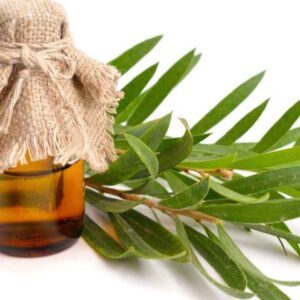
There are many dog owners who are concerned about the subject of tea tree oil dog toxicity. Some dog owners are looking for natural remedies these days, rather than conventional treatments. This is leading to some serious consequences for the choices they are making.
Tea tree oil has become an increasingly popular "natural" remedy in recent years for humans, but this essential oil can actually be very toxic for dogs if used improperly. This article will focus on tea tree oil toxicity risks, specifically for canines, and provide important safety information for dog owners.
Tea tree oil, also known as melaleuca oil, is derived from the leaves of the Australian tea tree (melaleuca alternifolia). Tea tree oil toxicity can occur in dogs through ingestion, skin contact, or inhalation of this essential oil. Understanding the dangers of tea tree oil exposure is crucial for protecting your canine companions.
Vet Says Essential Oils Can Poison Pets - YouTube Video
https://youtu.be/2z7CFTqqrOo?si=IN0H7fYTSKjxny10
How is Tea Tree Oil Essential Oil Toxic for Dogs?
The terpenes and phenols in tea tree oil can be toxic to dogs if consumed or absorbed excessively. This is because dogs have limited liver enzymes to break down these compounds.
Toxicity occurs because tea tree oil is rapidly absorbed into the bloodstream when licked or applied topically. This leads to depression of the nervous system and symptoms like tremors, weakness, and low body temperature occur.
Vomiting, diarrhea, and loss of coordination are also common effects of tea tree oil exposure in dogs. Furthermore, in severe cases, it can lead to seizures, coma, and even death.
Disclosure
Some of the links on this site are affiliate links, including links in images. This means that if you click on such a link and purchase something, I will receive an affiliate commission at no extra cost to you. I need income to continue bringing you useful content and I've got to eat, right?
Veterinary Data Reveals Hundreds of Tea Tree Oil Dog Poisonings
Veterinarians have seen many cases of accidental tea tree oil poisoning in dogs.
A recent analysis of data from the ASPCA (Animal Poison Control Center), identified 389 cases of tea tree oil exposure in dogs over a 5-year period.
Nearly 90% of these dogs showed clinical symptoms within 6 hours, most commonly vomiting, lethargy, and tremors. Sadly, two dogs died after absorbing high concentrations through their skin.
This data clearly shows that concentrated tea tree oil should never be used directly on dogs, as accidental ingestion or absorption of tea tree oil can cause severe poisoning or even death. But even small ingested amounts can be hazardous and topical use can result in a severe skin condition if not properly diluted.
What Are Common Symptoms of Toxicity?
Dog owners should watch for these common signs of tea tree oil toxicity:
- Vomiting, drooling, diarrhea
- Tremors, shaking, twitching
- Lethargy, weakness, depression
- Hypothermia
- Rapid breathing
- Loss of coordination, stumbling
- Collapse, loss of consciousness
If you notice these symptoms in your dog after potential tea tree oil exposure, seek veterinary care immediately to improve your dog's chances of a full recovery. Rapid treatment is essential.
What Should I Do If My Dog is Exposed to Tea Tree Oil?

Photo by Alan King on Unsplash
For mild tea tree oil poisoning cases:
- Inducing vomiting at home is often recommended if ingestion just occurred. This can remove some oil before it's absorbed. Consult your vet if you need advice on this.
- Small dogs, even in cases of mild exposure, should be seen by a vet. The dose of toxin per pound of body weight is higher compared to larger dogs.
- Activated charcoal may be given to absorb any remaining oil in the stomach.
- Intravenous fluids help flush the toxin and prevent kidney damage - seek veterinary assistance
- Mild cases have an excellent chance of full recovery within 24 hours with prompt veterinary treatment.
Additional precautions and indications for moderate tea tree oil poisoning cases:
- Anti-nausea medications may be given to control vomiting.
- Electrolyte support is important to counter dehydration and imbalance.
- Lethargy and muscle tremors are common but often resolve within 12-24 hours.
- Medium to large dogs have a very good prognosis with 1-2 days of supportive veterinary care.
For severe tea tree oil poisoning cases:
- Seizures, coma, hypothermia, and respiratory depression can occur after significant exposure. These cases require urgent veterinary management.
- In large dogs, these life-threatening signs are less likely unless huge amounts of oil are absorbed. However, small dogs can develop severe poisoning from relatively small volumes.
- Oxygen therapy, intravenous lipid emulsions, and other aggressive treatments may be needed. Your dog may need to stay at the veterinary practice for 2-3 days for observation.
- The prognosis is poor in severe toxicity cases. Sadly, some small dogs may not survive despite the best veterinary efforts. Rapid decontamination and treatment are vital.
Additionally, for skin exposure, bathe your dog immediately with normal shampoo to dilute and break down the oil. Avoid contact with eyes. For inhalation, bring your dog into fresh air and monitor its breathing closely. Seek veterinary care urgently if respiratory distress occurs.
Blood pressure support for your dog may be necessary, your vet will advise you on this.
Most dogs do well with adequate support. However, a small dog size, underlying health issues, and delay in treatment may complicate and worsen the situation. Prevention by keeping tea tree oil products away from pets in the first place is highly recommended.
In all cases, act quickly if you believe your dog has ingested, or been exposed to, tea tree oil.
With proper treatment, most dogs will fully recover within 2-3 days after minor tea tree oil exposure. Rapid veterinary care is key.
Is Diluted Tea Tree Oil Ever Safe for Use on Dogs?

Photo by Alvan Nee on Unsplash
There is debate on this question. Some natural pet care sites claim that highly diluted tea tree oil can be safely applied to dogs when following certain precautions.
The American Veterinary Medical Association states tea tree oil should never be used on cats (cats are more sensitive to the effects of essential oils). For dogs, they note that toxicity from small diluted amounts is less likely.
However, many vets still argue there is insufficient evidence of the effectiveness of essential oils or their safety for animal use.
Responsible use means avoiding concentrated or undiluted applications and only using vet-approved products specifically formulated for dogs.
Are Essential Oil Diffusers Safe Around Dogs?

Inhaling diffused tea tree oil from diffusers can certainly put dogs at risk; especially in confined, unventilated places. Dogs can develop nose, throat, and lung irritation, coughing, and lethargy from repeated exposure to the vapors.
The ASPCA recommends avoiding the use of any tea tree oil diffusers in rooms where your dogs spend time. If you do use one, discontinue use immediately if a dog shows signs of respiratory distress.
5 Key Tips to Prevent Tea Tree Oil Poisoning in Dogs
Here are 5 vital tips for dog owners to prevent tea tree oil toxicity:
- Never use concentrated or undiluted tea tree oil products directly on your dog
- Do not allow dogs access to tea tree oil products that are meant for human use
- Only use vet-recommended products containing highly diluted tea tree oil
- Avoid diffusing tea tree oil in homes with dogs present
- Call your vet right away if exposure occurs for prompt treatment
While natural products can seem appealing, it's important to consult your vet before using them. Tea tree oil may be therapeutic for humans, but it can have toxic effects in dogs. Exercise caution and keep all concentrated tea tree products safely out of your dog's reach.
The Takeaway: Enjoy Aromatherapy Safely by Excluding Dogs
Tea tree oil dog toxicity is something that you should be acutely aware of as a dog owner and you should adhere to the safety protocols mentioned above. Concentrated tea tree oil can be toxic for dogs through ingestion, skin contact, or inhalation. Small amounts may sicken pets. Understanding these toxicity risks allows dog owners to safely use aromatherapy products through proper precautions.
Seeking veterinary advice before using any essential oil product on or around your dog is strongly recommended. Never assume an oil is automatically safe just because it is plant-based. With thoughtful care, we can relax with aromatherapy without putting our dogs in danger.
Tea Tree Oil Dog Toxicity FAQs
What is tea tree oil?
Tea tree oil is an essential oil derived from the leaves of the Australian tea tree (melaleuca alternifolia). It is also known as melaleuca oil.
Is tea tree oil toxic to dogs and cats?
Yes, tea tree oil is toxic to both dogs and cats. It can cause a range of clinical signs and should be used with caution.
What are the clinical signs of tea tree oil dog toxicity?
The clinical signs of tea tree oil toxicity in dogs may include tremors, vomiting, rapid breathing, low body temperature, lethargy, weakness, shaking, and more.
How should I use tea tree oil on dogs?
Tea tree oil should never be used topically or ingested by dogs. It can be toxic to them and cause various health problems. There are schools of thought that vet-approved oils can be used for dogs, however, there are no well-documented studies that support their efficacy.
Are there any safe amounts of tea tree oil for dogs?
Yes, but the oil requires the appropriate dilution. See the question below "Can tea tree oil be used on dogs as a flea treatment?" - You have to question the efficacy of the product at such dilutions and determine whether it is worth using. There are products such as shampoos on the market that have a dilution of 1 -2% and are considered safe. However, there is still ongoing debate on what is safe.
Can tea tree oil be used on dogs as a flea treatment?
It is not recommended to use tea tree oil for your dog as a flea treatment, as there are safer and more effective options available. There is a chemical contained in conventional products that target the flea's biology. If you insist on using tea tree oil, be sure to dilute it and ensure the dilution is in the range of 0.1% to 1%. NB: you may find it difficult to get the dilution in the correct range and there will be a danger of making the solution too strong for your dog.
What should I do if my dog ingests tea tree oil?
If your dog ingests tea tree oil, you should contact your veterinarian or a poison control center immediately for guidance. Do not delay.
Is tea tree oil toxic to cats?
Yes, tea tree oil is toxic to cats as well. Cats are more sensitive to certain essential oils, including tea tree oil.
Where can I find more information about tea tree oil toxicity in pets?
You can find more information about tea tree oil toxicity in pets from reputable veterinary sources, such as the ASPCA (Animal Poison Control Center) or your local veterinarian.

© Natural Wellness Solutions
Links
Natural Wellness Solutions
Read the full article
0 notes
Link
How to Use Tea Tree Oil for Pimples, Acne, Scars, Marks
0 notes
